Kolb's Cycle, Stressors, and Coping Strategies for Healthcare Managers
VerifiedAdded on 2023/01/12
|12
|3873
|73
Report
AI Summary
This report delves into the Kolb cycle of learning, analyzing its application to personal development and healthcare management. It begins by outlining the Kolb cycle's four stages: concrete learning, reflective observation, abstract conceptualization, and active experimentation, and how these relate to different learning styles. The report then examines the strengths and qualities that contribute to personal development, including self-awareness, identity formation, and talent discovery. Furthermore, it addresses stressors commonly faced by healthcare managers, providing recommendations for effective coping strategies. The report concludes with an action plan designed to enhance personal learning skills, focusing on time management and the ability to achieve objectives efficiently. The report's content offers valuable insights for healthcare professionals and students seeking to improve their learning process and management skills.
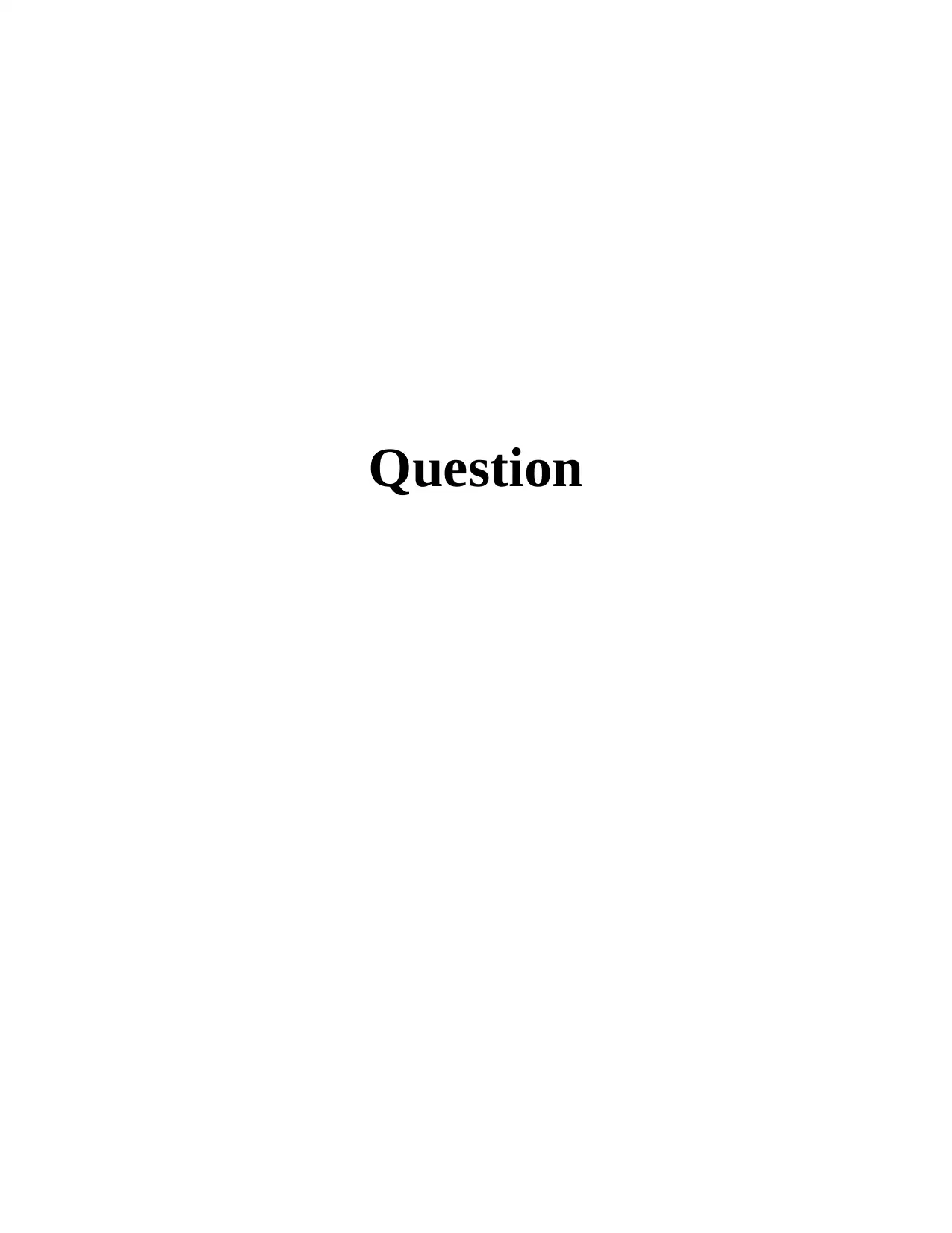
Question
Paraphrase This Document
Need a fresh take? Get an instant paraphrase of this document with our AI Paraphraser
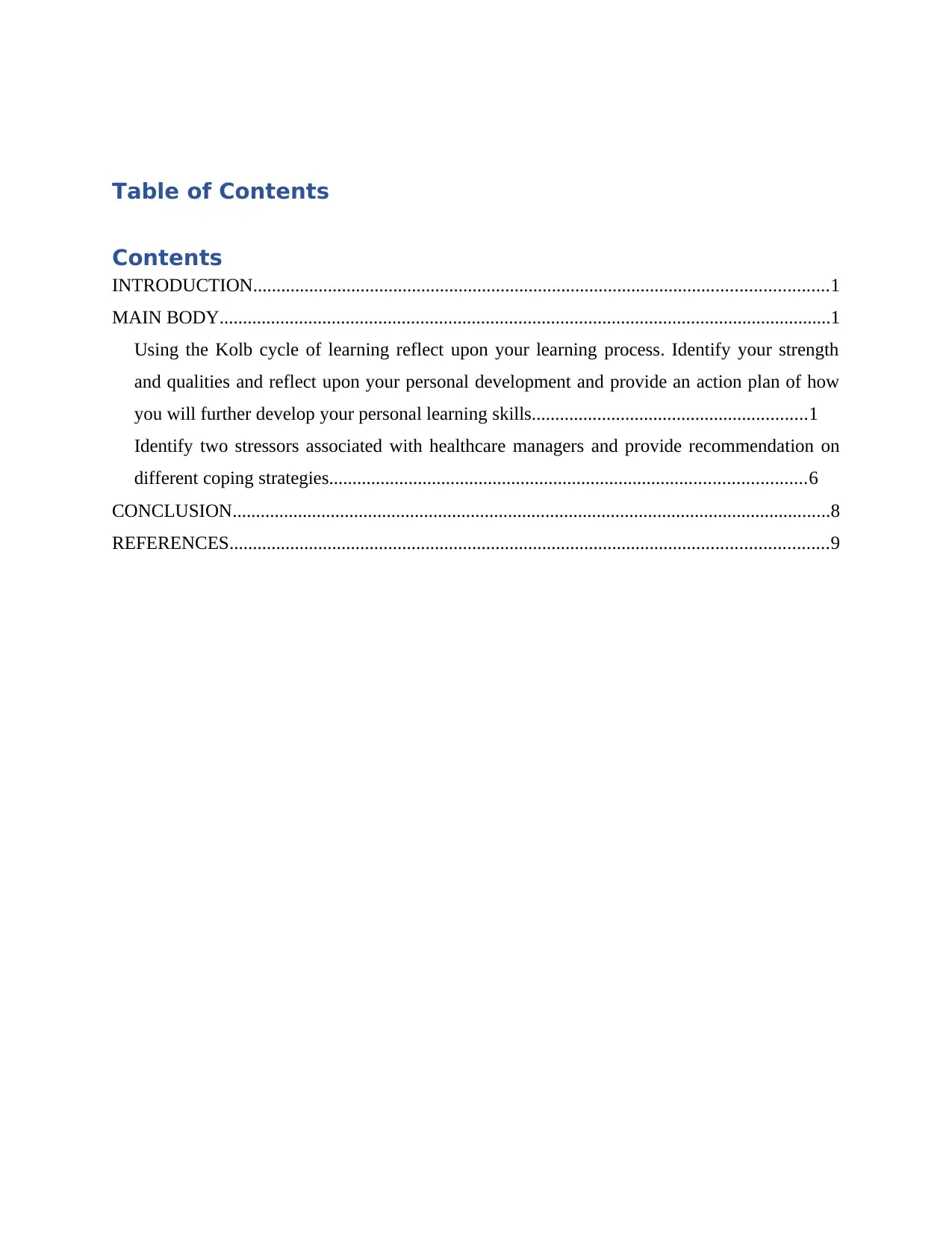
Table of Contents
Contents
INTRODUCTION...........................................................................................................................1
MAIN BODY...................................................................................................................................1
Using the Kolb cycle of learning reflect upon your learning process. Identify your strength
and qualities and reflect upon your personal development and provide an action plan of how
you will further develop your personal learning skills...........................................................1
Identify two stressors associated with healthcare managers and provide recommendation on
different coping strategies......................................................................................................6
CONCLUSION................................................................................................................................8
REFERENCES................................................................................................................................9
Contents
INTRODUCTION...........................................................................................................................1
MAIN BODY...................................................................................................................................1
Using the Kolb cycle of learning reflect upon your learning process. Identify your strength
and qualities and reflect upon your personal development and provide an action plan of how
you will further develop your personal learning skills...........................................................1
Identify two stressors associated with healthcare managers and provide recommendation on
different coping strategies......................................................................................................6
CONCLUSION................................................................................................................................8
REFERENCES................................................................................................................................9
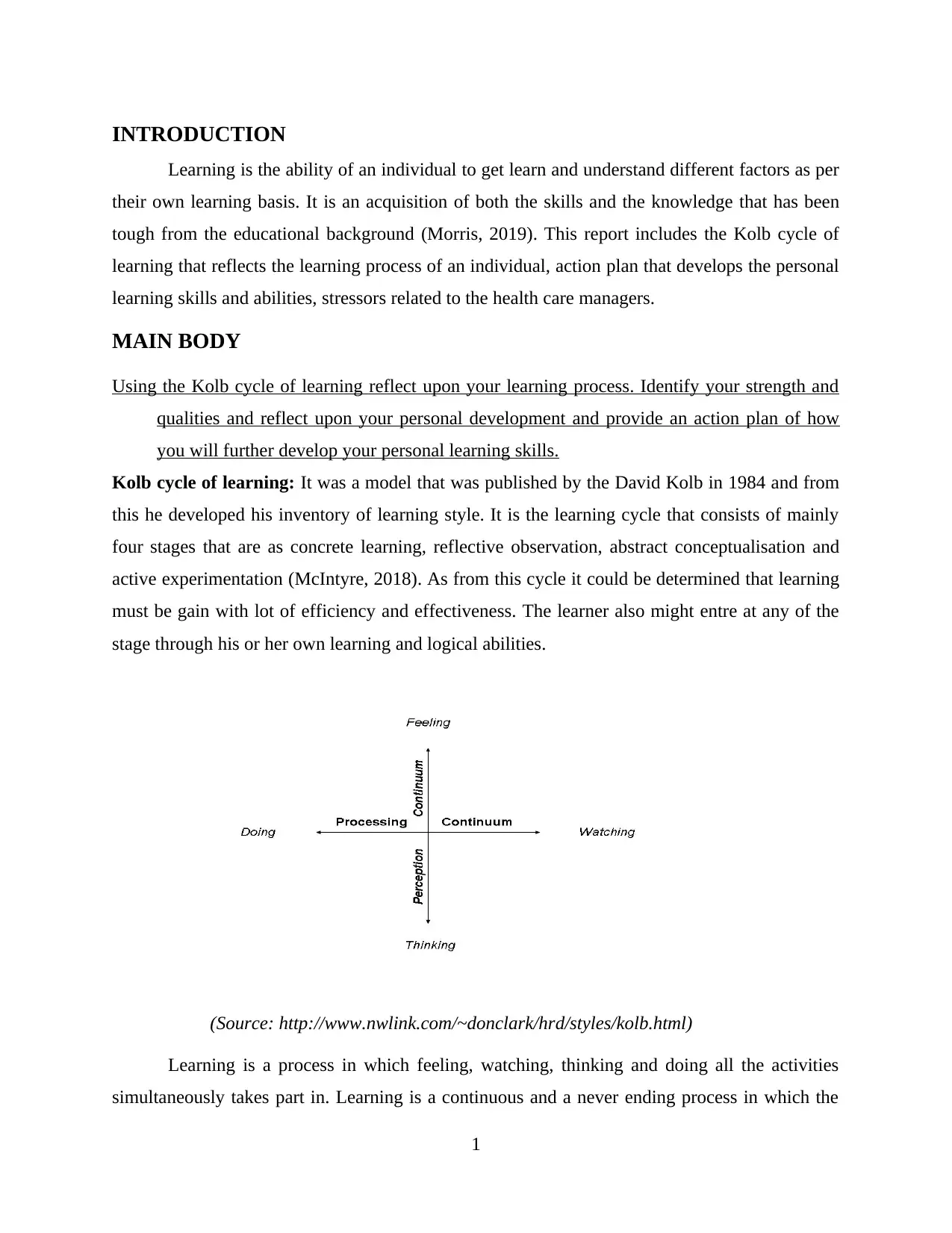
INTRODUCTION
Learning is the ability of an individual to get learn and understand different factors as per
their own learning basis. It is an acquisition of both the skills and the knowledge that has been
tough from the educational background (Morris, 2019). This report includes the Kolb cycle of
learning that reflects the learning process of an individual, action plan that develops the personal
learning skills and abilities, stressors related to the health care managers.
MAIN BODY
Using the Kolb cycle of learning reflect upon your learning process. Identify your strength and
qualities and reflect upon your personal development and provide an action plan of how
you will further develop your personal learning skills.
Kolb cycle of learning: It was a model that was published by the David Kolb in 1984 and from
this he developed his inventory of learning style. It is the learning cycle that consists of mainly
four stages that are as concrete learning, reflective observation, abstract conceptualisation and
active experimentation (McIntyre, 2018). As from this cycle it could be determined that learning
must be gain with lot of efficiency and effectiveness. The learner also might entre at any of the
stage through his or her own learning and logical abilities.
(Source: http://www.nwlink.com/~donclark/hrd/styles/kolb.html)
Learning is a process in which feeling, watching, thinking and doing all the activities
simultaneously takes part in. Learning is a continuous and a never ending process in which the
1
Learning is the ability of an individual to get learn and understand different factors as per
their own learning basis. It is an acquisition of both the skills and the knowledge that has been
tough from the educational background (Morris, 2019). This report includes the Kolb cycle of
learning that reflects the learning process of an individual, action plan that develops the personal
learning skills and abilities, stressors related to the health care managers.
MAIN BODY
Using the Kolb cycle of learning reflect upon your learning process. Identify your strength and
qualities and reflect upon your personal development and provide an action plan of how
you will further develop your personal learning skills.
Kolb cycle of learning: It was a model that was published by the David Kolb in 1984 and from
this he developed his inventory of learning style. It is the learning cycle that consists of mainly
four stages that are as concrete learning, reflective observation, abstract conceptualisation and
active experimentation (McIntyre, 2018). As from this cycle it could be determined that learning
must be gain with lot of efficiency and effectiveness. The learner also might entre at any of the
stage through his or her own learning and logical abilities.
(Source: http://www.nwlink.com/~donclark/hrd/styles/kolb.html)
Learning is a process in which feeling, watching, thinking and doing all the activities
simultaneously takes part in. Learning is a continuous and a never ending process in which the
1
⊘ This is a preview!⊘
Do you want full access?
Subscribe today to unlock all pages.

Trusted by 1+ million students worldwide
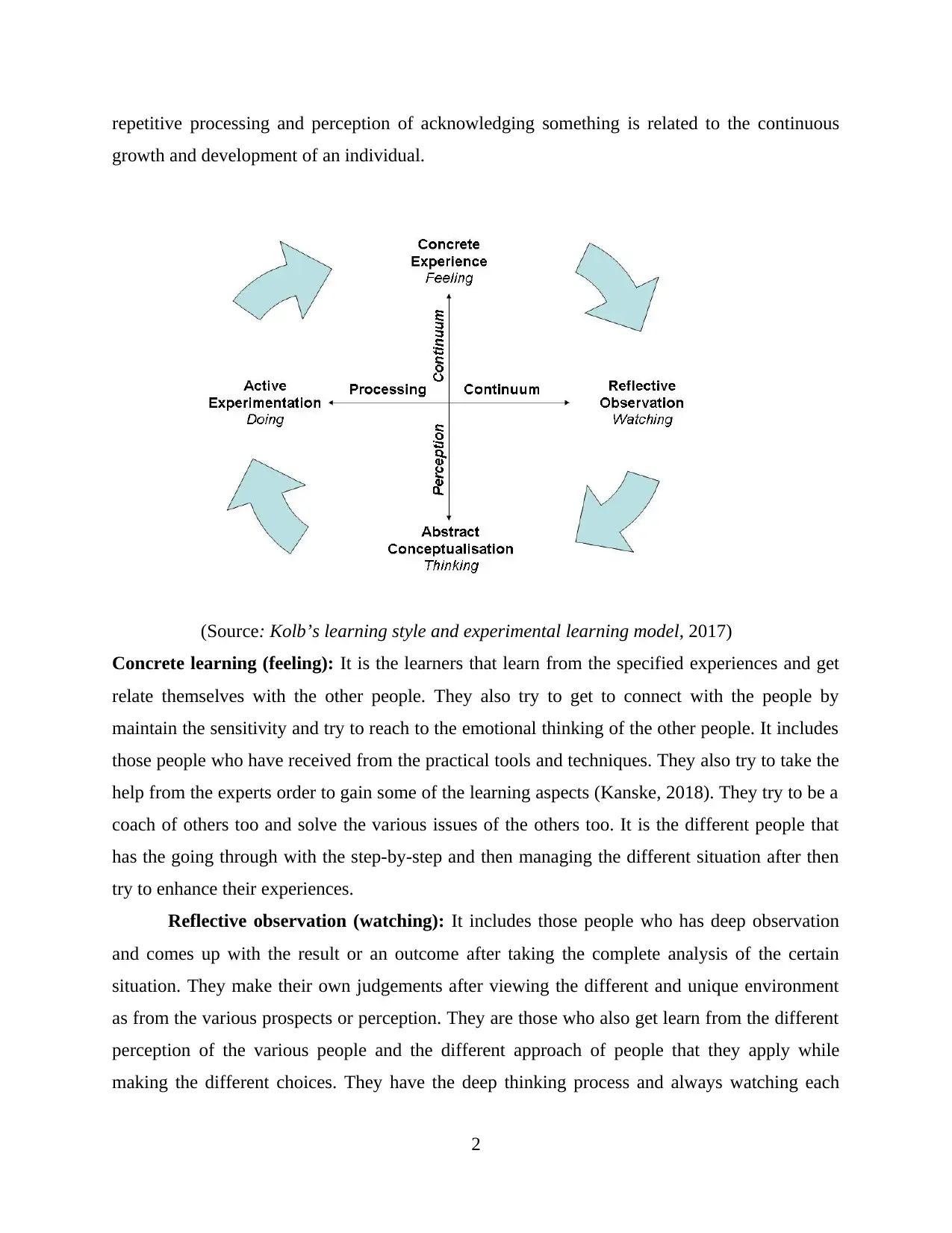
repetitive processing and perception of acknowledging something is related to the continuous
growth and development of an individual.
(Source: Kolb’s learning style and experimental learning model, 2017)
Concrete learning (feeling): It is the learners that learn from the specified experiences and get
relate themselves with the other people. They also try to get to connect with the people by
maintain the sensitivity and try to reach to the emotional thinking of the other people. It includes
those people who have received from the practical tools and techniques. They also try to take the
help from the experts order to gain some of the learning aspects (Kanske, 2018). They try to be a
coach of others too and solve the various issues of the others too. It is the different people that
has the going through with the step-by-step and then managing the different situation after then
try to enhance their experiences.
Reflective observation (watching): It includes those people who has deep observation
and comes up with the result or an outcome after taking the complete analysis of the certain
situation. They make their own judgements after viewing the different and unique environment
as from the various prospects or perception. They are those who also get learn from the different
perception of the various people and the different approach of people that they apply while
making the different choices. They have the deep thinking process and always watching each
2
growth and development of an individual.
(Source: Kolb’s learning style and experimental learning model, 2017)
Concrete learning (feeling): It is the learners that learn from the specified experiences and get
relate themselves with the other people. They also try to get to connect with the people by
maintain the sensitivity and try to reach to the emotional thinking of the other people. It includes
those people who have received from the practical tools and techniques. They also try to take the
help from the experts order to gain some of the learning aspects (Kanske, 2018). They try to be a
coach of others too and solve the various issues of the others too. It is the different people that
has the going through with the step-by-step and then managing the different situation after then
try to enhance their experiences.
Reflective observation (watching): It includes those people who has deep observation
and comes up with the result or an outcome after taking the complete analysis of the certain
situation. They make their own judgements after viewing the different and unique environment
as from the various prospects or perception. They are those who also get learn from the different
perception of the various people and the different approach of people that they apply while
making the different choices. They have the deep thinking process and always watching each
2
Paraphrase This Document
Need a fresh take? Get an instant paraphrase of this document with our AI Paraphraser
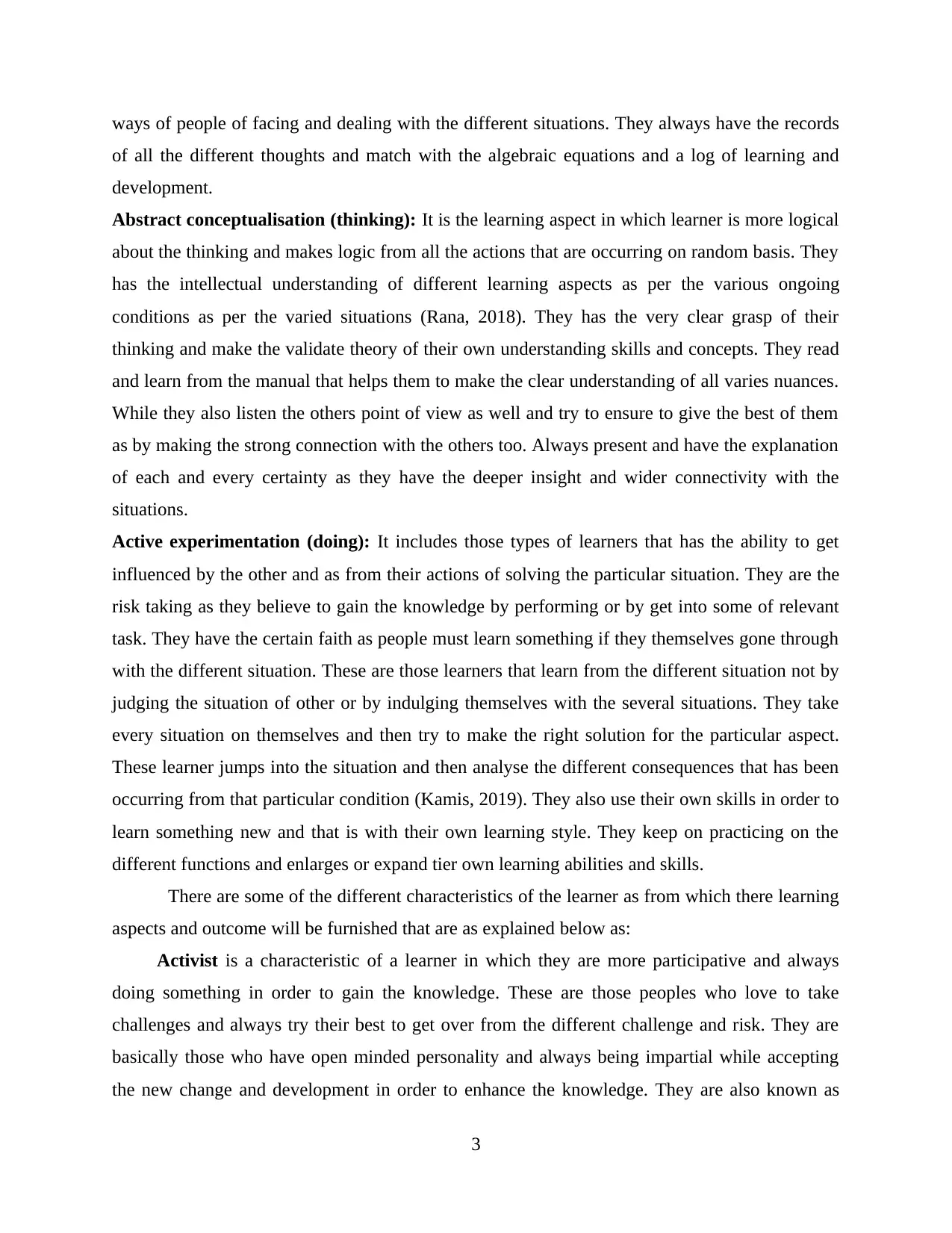
ways of people of facing and dealing with the different situations. They always have the records
of all the different thoughts and match with the algebraic equations and a log of learning and
development.
Abstract conceptualisation (thinking): It is the learning aspect in which learner is more logical
about the thinking and makes logic from all the actions that are occurring on random basis. They
has the intellectual understanding of different learning aspects as per the various ongoing
conditions as per the varied situations (Rana, 2018). They has the very clear grasp of their
thinking and make the validate theory of their own understanding skills and concepts. They read
and learn from the manual that helps them to make the clear understanding of all varies nuances.
While they also listen the others point of view as well and try to ensure to give the best of them
as by making the strong connection with the others too. Always present and have the explanation
of each and every certainty as they have the deeper insight and wider connectivity with the
situations.
Active experimentation (doing): It includes those types of learners that has the ability to get
influenced by the other and as from their actions of solving the particular situation. They are the
risk taking as they believe to gain the knowledge by performing or by get into some of relevant
task. They have the certain faith as people must learn something if they themselves gone through
with the different situation. These are those learners that learn from the different situation not by
judging the situation of other or by indulging themselves with the several situations. They take
every situation on themselves and then try to make the right solution for the particular aspect.
These learner jumps into the situation and then analyse the different consequences that has been
occurring from that particular condition (Kamis, 2019). They also use their own skills in order to
learn something new and that is with their own learning style. They keep on practicing on the
different functions and enlarges or expand tier own learning abilities and skills.
There are some of the different characteristics of the learner as from which there learning
aspects and outcome will be furnished that are as explained below as:
Activist is a characteristic of a learner in which they are more participative and always
doing something in order to gain the knowledge. These are those peoples who love to take
challenges and always try their best to get over from the different challenge and risk. They are
basically those who have open minded personality and always being impartial while accepting
the new change and development in order to enhance the knowledge. They are also known as
3
of all the different thoughts and match with the algebraic equations and a log of learning and
development.
Abstract conceptualisation (thinking): It is the learning aspect in which learner is more logical
about the thinking and makes logic from all the actions that are occurring on random basis. They
has the intellectual understanding of different learning aspects as per the various ongoing
conditions as per the varied situations (Rana, 2018). They has the very clear grasp of their
thinking and make the validate theory of their own understanding skills and concepts. They read
and learn from the manual that helps them to make the clear understanding of all varies nuances.
While they also listen the others point of view as well and try to ensure to give the best of them
as by making the strong connection with the others too. Always present and have the explanation
of each and every certainty as they have the deeper insight and wider connectivity with the
situations.
Active experimentation (doing): It includes those types of learners that has the ability to get
influenced by the other and as from their actions of solving the particular situation. They are the
risk taking as they believe to gain the knowledge by performing or by get into some of relevant
task. They have the certain faith as people must learn something if they themselves gone through
with the different situation. These are those learners that learn from the different situation not by
judging the situation of other or by indulging themselves with the several situations. They take
every situation on themselves and then try to make the right solution for the particular aspect.
These learner jumps into the situation and then analyse the different consequences that has been
occurring from that particular condition (Kamis, 2019). They also use their own skills in order to
learn something new and that is with their own learning style. They keep on practicing on the
different functions and enlarges or expand tier own learning abilities and skills.
There are some of the different characteristics of the learner as from which there learning
aspects and outcome will be furnished that are as explained below as:
Activist is a characteristic of a learner in which they are more participative and always
doing something in order to gain the knowledge. These are those peoples who love to take
challenges and always try their best to get over from the different challenge and risk. They are
basically those who have open minded personality and always being impartial while accepting
the new change and development in order to enhance the knowledge. They are also known as
3
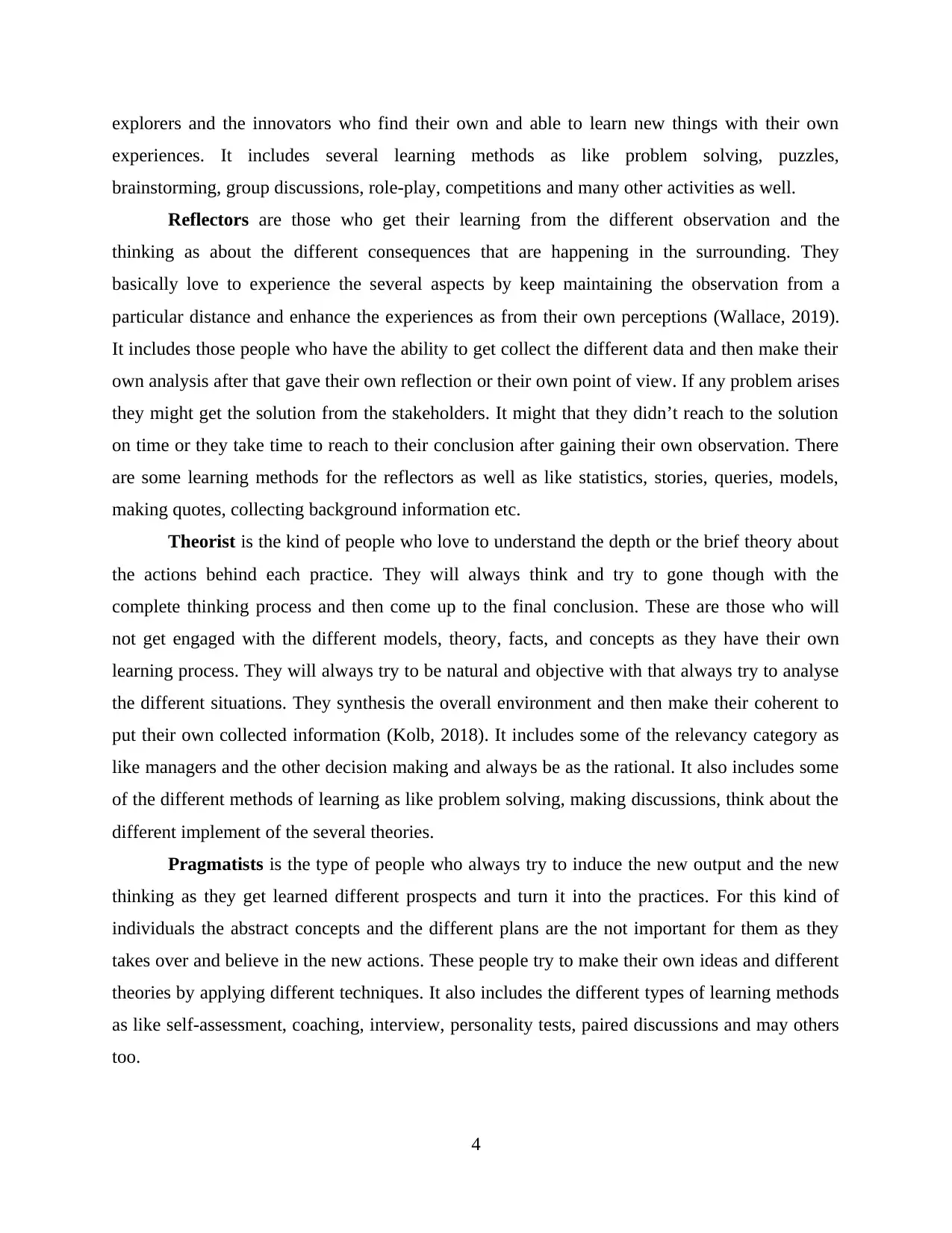
explorers and the innovators who find their own and able to learn new things with their own
experiences. It includes several learning methods as like problem solving, puzzles,
brainstorming, group discussions, role-play, competitions and many other activities as well.
Reflectors are those who get their learning from the different observation and the
thinking as about the different consequences that are happening in the surrounding. They
basically love to experience the several aspects by keep maintaining the observation from a
particular distance and enhance the experiences as from their own perceptions (Wallace, 2019).
It includes those people who have the ability to get collect the different data and then make their
own analysis after that gave their own reflection or their own point of view. If any problem arises
they might get the solution from the stakeholders. It might that they didn’t reach to the solution
on time or they take time to reach to their conclusion after gaining their own observation. There
are some learning methods for the reflectors as well as like statistics, stories, queries, models,
making quotes, collecting background information etc.
Theorist is the kind of people who love to understand the depth or the brief theory about
the actions behind each practice. They will always think and try to gone though with the
complete thinking process and then come up to the final conclusion. These are those who will
not get engaged with the different models, theory, facts, and concepts as they have their own
learning process. They will always try to be natural and objective with that always try to analyse
the different situations. They synthesis the overall environment and then make their coherent to
put their own collected information (Kolb, 2018). It includes some of the relevancy category as
like managers and the other decision making and always be as the rational. It also includes some
of the different methods of learning as like problem solving, making discussions, think about the
different implement of the several theories.
Pragmatists is the type of people who always try to induce the new output and the new
thinking as they get learned different prospects and turn it into the practices. For this kind of
individuals the abstract concepts and the different plans are the not important for them as they
takes over and believe in the new actions. These people try to make their own ideas and different
theories by applying different techniques. It also includes the different types of learning methods
as like self-assessment, coaching, interview, personality tests, paired discussions and may others
too.
4
experiences. It includes several learning methods as like problem solving, puzzles,
brainstorming, group discussions, role-play, competitions and many other activities as well.
Reflectors are those who get their learning from the different observation and the
thinking as about the different consequences that are happening in the surrounding. They
basically love to experience the several aspects by keep maintaining the observation from a
particular distance and enhance the experiences as from their own perceptions (Wallace, 2019).
It includes those people who have the ability to get collect the different data and then make their
own analysis after that gave their own reflection or their own point of view. If any problem arises
they might get the solution from the stakeholders. It might that they didn’t reach to the solution
on time or they take time to reach to their conclusion after gaining their own observation. There
are some learning methods for the reflectors as well as like statistics, stories, queries, models,
making quotes, collecting background information etc.
Theorist is the kind of people who love to understand the depth or the brief theory about
the actions behind each practice. They will always think and try to gone though with the
complete thinking process and then come up to the final conclusion. These are those who will
not get engaged with the different models, theory, facts, and concepts as they have their own
learning process. They will always try to be natural and objective with that always try to analyse
the different situations. They synthesis the overall environment and then make their coherent to
put their own collected information (Kolb, 2018). It includes some of the relevancy category as
like managers and the other decision making and always be as the rational. It also includes some
of the different methods of learning as like problem solving, making discussions, think about the
different implement of the several theories.
Pragmatists is the type of people who always try to induce the new output and the new
thinking as they get learned different prospects and turn it into the practices. For this kind of
individuals the abstract concepts and the different plans are the not important for them as they
takes over and believe in the new actions. These people try to make their own ideas and different
theories by applying different techniques. It also includes the different types of learning methods
as like self-assessment, coaching, interview, personality tests, paired discussions and may others
too.
4
⊘ This is a preview!⊘
Do you want full access?
Subscribe today to unlock all pages.

Trusted by 1+ million students worldwide
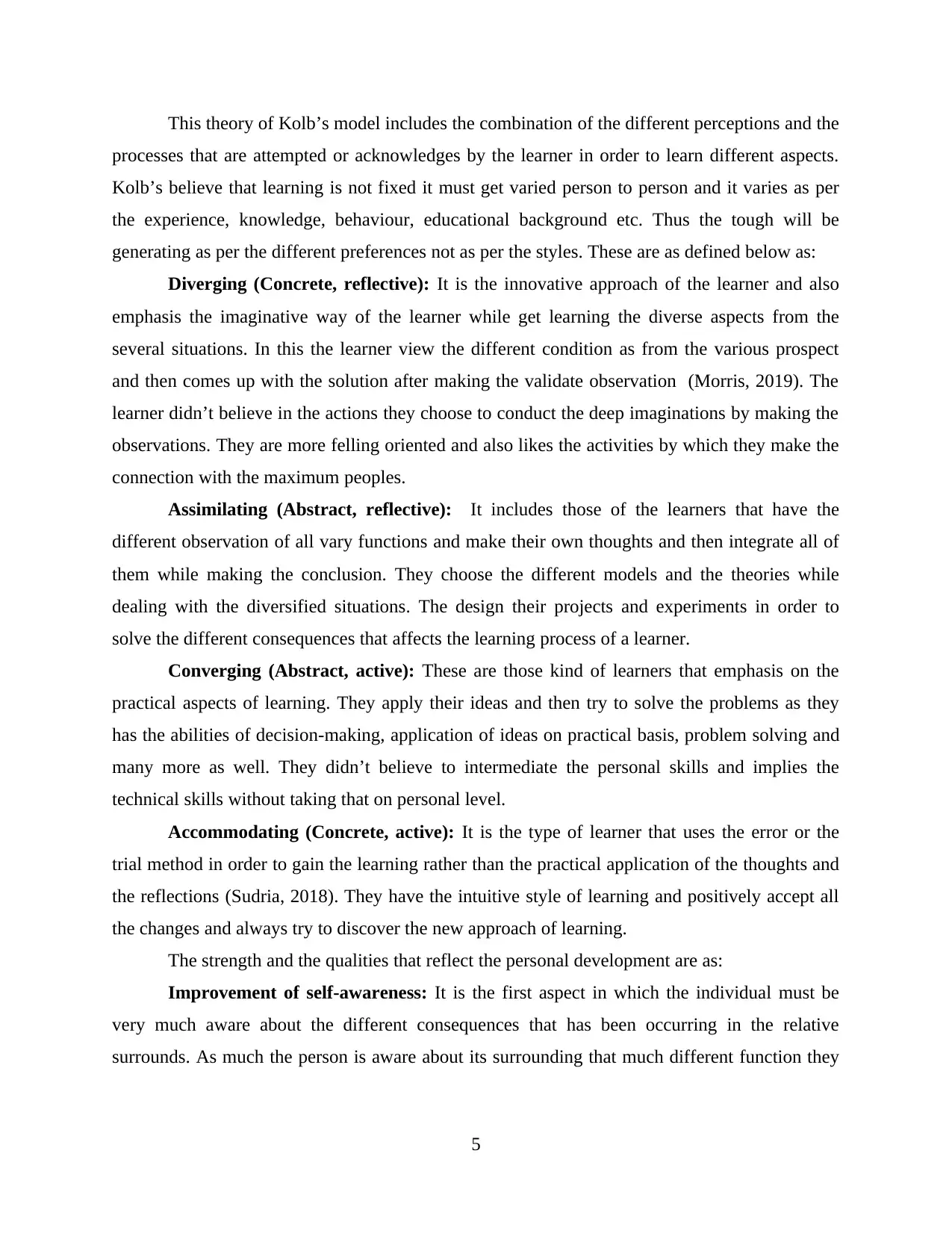
This theory of Kolb’s model includes the combination of the different perceptions and the
processes that are attempted or acknowledges by the learner in order to learn different aspects.
Kolb’s believe that learning is not fixed it must get varied person to person and it varies as per
the experience, knowledge, behaviour, educational background etc. Thus the tough will be
generating as per the different preferences not as per the styles. These are as defined below as:
Diverging (Concrete, reflective): It is the innovative approach of the learner and also
emphasis the imaginative way of the learner while get learning the diverse aspects from the
several situations. In this the learner view the different condition as from the various prospect
and then comes up with the solution after making the validate observation (Morris, 2019). The
learner didn’t believe in the actions they choose to conduct the deep imaginations by making the
observations. They are more felling oriented and also likes the activities by which they make the
connection with the maximum peoples.
Assimilating (Abstract, reflective): It includes those of the learners that have the
different observation of all vary functions and make their own thoughts and then integrate all of
them while making the conclusion. They choose the different models and the theories while
dealing with the diversified situations. The design their projects and experiments in order to
solve the different consequences that affects the learning process of a learner.
Converging (Abstract, active): These are those kind of learners that emphasis on the
practical aspects of learning. They apply their ideas and then try to solve the problems as they
has the abilities of decision-making, application of ideas on practical basis, problem solving and
many more as well. They didn’t believe to intermediate the personal skills and implies the
technical skills without taking that on personal level.
Accommodating (Concrete, active): It is the type of learner that uses the error or the
trial method in order to gain the learning rather than the practical application of the thoughts and
the reflections (Sudria, 2018). They have the intuitive style of learning and positively accept all
the changes and always try to discover the new approach of learning.
The strength and the qualities that reflect the personal development are as:
Improvement of self-awareness: It is the first aspect in which the individual must be
very much aware about the different consequences that has been occurring in the relative
surrounds. As much the person is aware about its surrounding that much different function they
5
processes that are attempted or acknowledges by the learner in order to learn different aspects.
Kolb’s believe that learning is not fixed it must get varied person to person and it varies as per
the experience, knowledge, behaviour, educational background etc. Thus the tough will be
generating as per the different preferences not as per the styles. These are as defined below as:
Diverging (Concrete, reflective): It is the innovative approach of the learner and also
emphasis the imaginative way of the learner while get learning the diverse aspects from the
several situations. In this the learner view the different condition as from the various prospect
and then comes up with the solution after making the validate observation (Morris, 2019). The
learner didn’t believe in the actions they choose to conduct the deep imaginations by making the
observations. They are more felling oriented and also likes the activities by which they make the
connection with the maximum peoples.
Assimilating (Abstract, reflective): It includes those of the learners that have the
different observation of all vary functions and make their own thoughts and then integrate all of
them while making the conclusion. They choose the different models and the theories while
dealing with the diversified situations. The design their projects and experiments in order to
solve the different consequences that affects the learning process of a learner.
Converging (Abstract, active): These are those kind of learners that emphasis on the
practical aspects of learning. They apply their ideas and then try to solve the problems as they
has the abilities of decision-making, application of ideas on practical basis, problem solving and
many more as well. They didn’t believe to intermediate the personal skills and implies the
technical skills without taking that on personal level.
Accommodating (Concrete, active): It is the type of learner that uses the error or the
trial method in order to gain the learning rather than the practical application of the thoughts and
the reflections (Sudria, 2018). They have the intuitive style of learning and positively accept all
the changes and always try to discover the new approach of learning.
The strength and the qualities that reflect the personal development are as:
Improvement of self-awareness: It is the first aspect in which the individual must be
very much aware about the different consequences that has been occurring in the relative
surrounds. As much the person is aware about its surrounding that much different function they
5
Paraphrase This Document
Need a fresh take? Get an instant paraphrase of this document with our AI Paraphraser
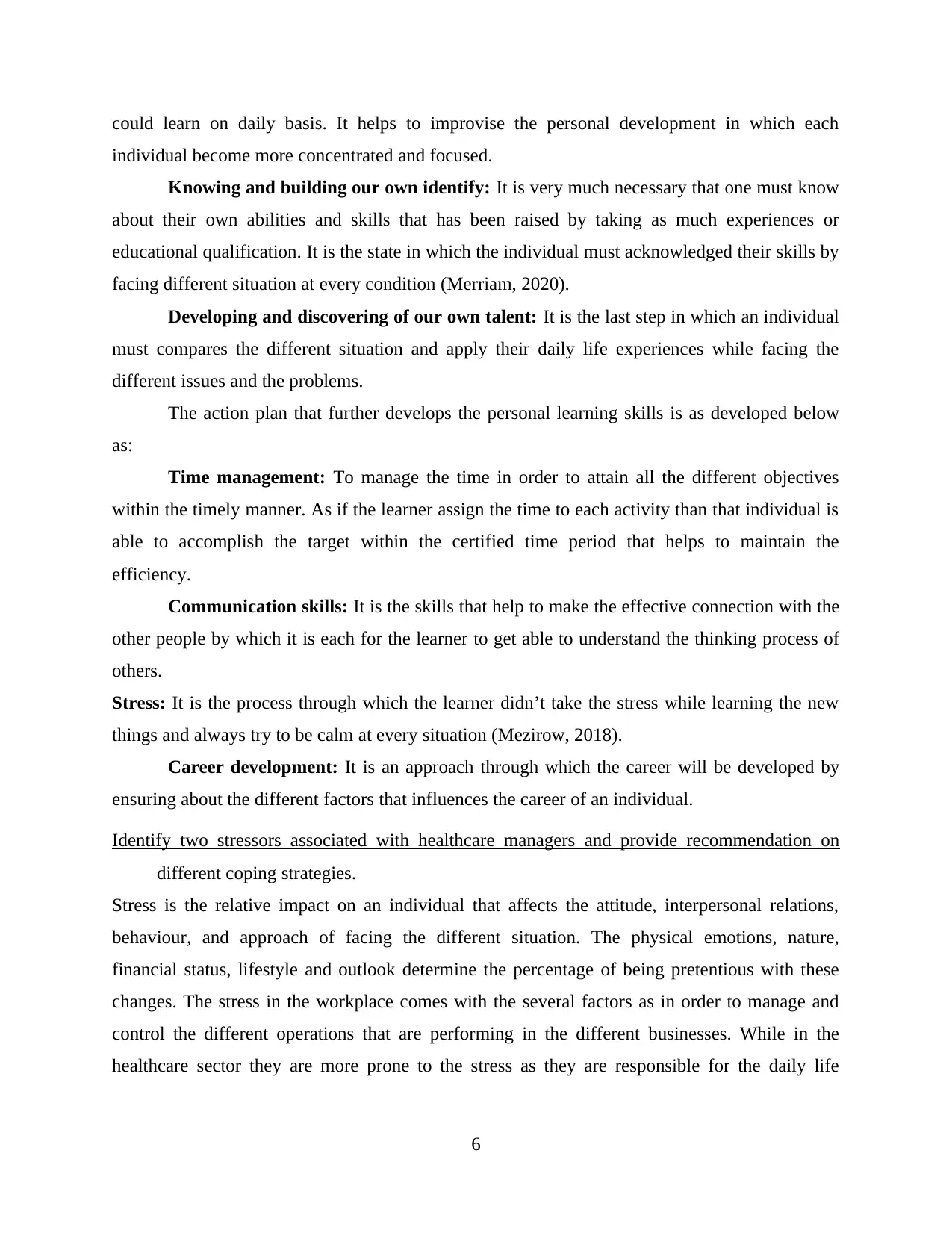
could learn on daily basis. It helps to improvise the personal development in which each
individual become more concentrated and focused.
Knowing and building our own identify: It is very much necessary that one must know
about their own abilities and skills that has been raised by taking as much experiences or
educational qualification. It is the state in which the individual must acknowledged their skills by
facing different situation at every condition (Merriam, 2020).
Developing and discovering of our own talent: It is the last step in which an individual
must compares the different situation and apply their daily life experiences while facing the
different issues and the problems.
The action plan that further develops the personal learning skills is as developed below
as:
Time management: To manage the time in order to attain all the different objectives
within the timely manner. As if the learner assign the time to each activity than that individual is
able to accomplish the target within the certified time period that helps to maintain the
efficiency.
Communication skills: It is the skills that help to make the effective connection with the
other people by which it is each for the learner to get able to understand the thinking process of
others.
Stress: It is the process through which the learner didn’t take the stress while learning the new
things and always try to be calm at every situation (Mezirow, 2018).
Career development: It is an approach through which the career will be developed by
ensuring about the different factors that influences the career of an individual.
Identify two stressors associated with healthcare managers and provide recommendation on
different coping strategies.
Stress is the relative impact on an individual that affects the attitude, interpersonal relations,
behaviour, and approach of facing the different situation. The physical emotions, nature,
financial status, lifestyle and outlook determine the percentage of being pretentious with these
changes. The stress in the workplace comes with the several factors as in order to manage and
control the different operations that are performing in the different businesses. While in the
healthcare sector they are more prone to the stress as they are responsible for the daily life
6
individual become more concentrated and focused.
Knowing and building our own identify: It is very much necessary that one must know
about their own abilities and skills that has been raised by taking as much experiences or
educational qualification. It is the state in which the individual must acknowledged their skills by
facing different situation at every condition (Merriam, 2020).
Developing and discovering of our own talent: It is the last step in which an individual
must compares the different situation and apply their daily life experiences while facing the
different issues and the problems.
The action plan that further develops the personal learning skills is as developed below
as:
Time management: To manage the time in order to attain all the different objectives
within the timely manner. As if the learner assign the time to each activity than that individual is
able to accomplish the target within the certified time period that helps to maintain the
efficiency.
Communication skills: It is the skills that help to make the effective connection with the
other people by which it is each for the learner to get able to understand the thinking process of
others.
Stress: It is the process through which the learner didn’t take the stress while learning the new
things and always try to be calm at every situation (Mezirow, 2018).
Career development: It is an approach through which the career will be developed by
ensuring about the different factors that influences the career of an individual.
Identify two stressors associated with healthcare managers and provide recommendation on
different coping strategies.
Stress is the relative impact on an individual that affects the attitude, interpersonal relations,
behaviour, and approach of facing the different situation. The physical emotions, nature,
financial status, lifestyle and outlook determine the percentage of being pretentious with these
changes. The stress in the workplace comes with the several factors as in order to manage and
control the different operations that are performing in the different businesses. While in the
healthcare sector they are more prone to the stress as they are responsible for the daily life
6
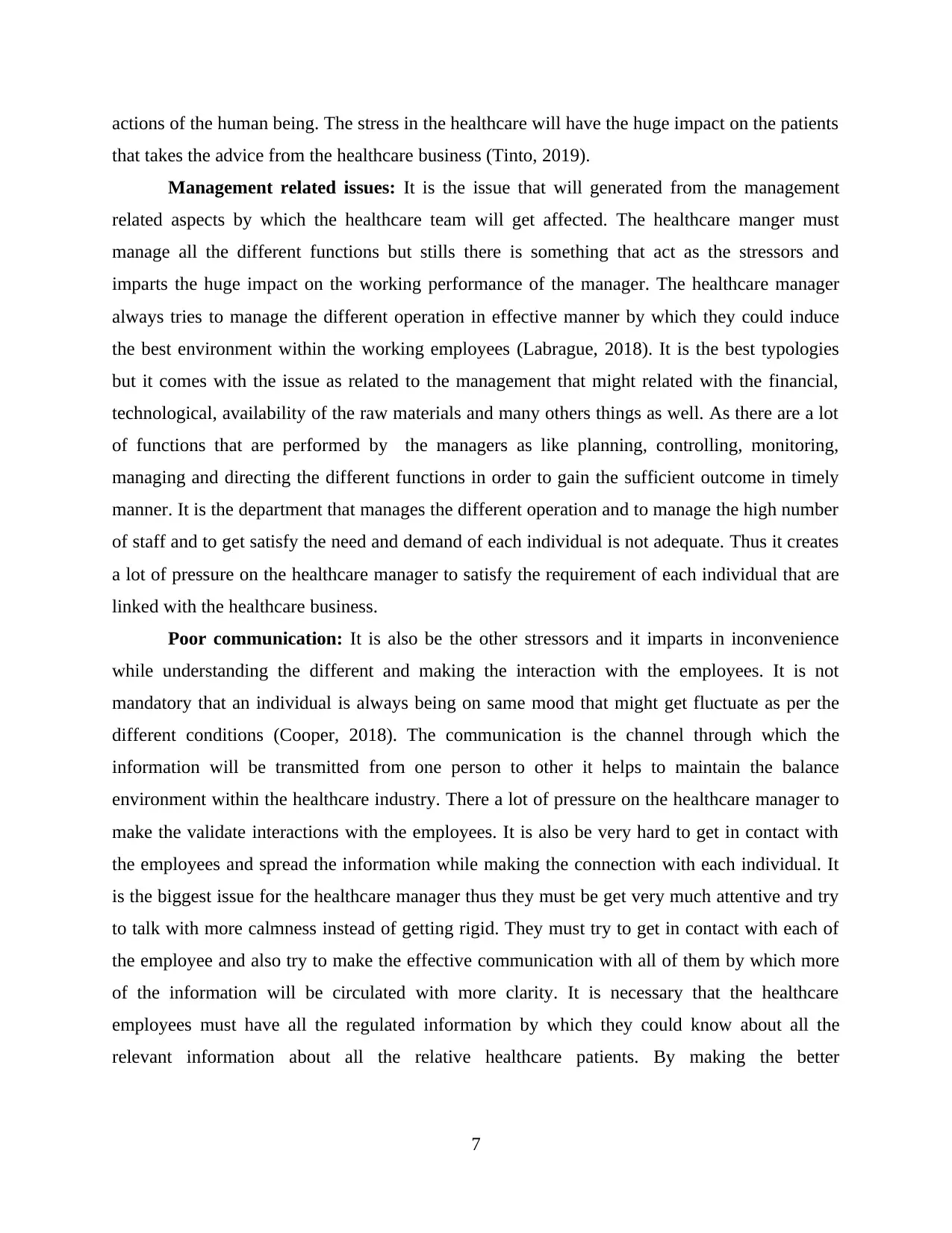
actions of the human being. The stress in the healthcare will have the huge impact on the patients
that takes the advice from the healthcare business (Tinto, 2019).
Management related issues: It is the issue that will generated from the management
related aspects by which the healthcare team will get affected. The healthcare manger must
manage all the different functions but stills there is something that act as the stressors and
imparts the huge impact on the working performance of the manager. The healthcare manager
always tries to manage the different operation in effective manner by which they could induce
the best environment within the working employees (Labrague, 2018). It is the best typologies
but it comes with the issue as related to the management that might related with the financial,
technological, availability of the raw materials and many others things as well. As there are a lot
of functions that are performed by the managers as like planning, controlling, monitoring,
managing and directing the different functions in order to gain the sufficient outcome in timely
manner. It is the department that manages the different operation and to manage the high number
of staff and to get satisfy the need and demand of each individual is not adequate. Thus it creates
a lot of pressure on the healthcare manager to satisfy the requirement of each individual that are
linked with the healthcare business.
Poor communication: It is also be the other stressors and it imparts in inconvenience
while understanding the different and making the interaction with the employees. It is not
mandatory that an individual is always being on same mood that might get fluctuate as per the
different conditions (Cooper, 2018). The communication is the channel through which the
information will be transmitted from one person to other it helps to maintain the balance
environment within the healthcare industry. There a lot of pressure on the healthcare manager to
make the validate interactions with the employees. It is also be very hard to get in contact with
the employees and spread the information while making the connection with each individual. It
is the biggest issue for the healthcare manager thus they must be get very much attentive and try
to talk with more calmness instead of getting rigid. They must try to get in contact with each of
the employee and also try to make the effective communication with all of them by which more
of the information will be circulated with more clarity. It is necessary that the healthcare
employees must have all the regulated information by which they could know about all the
relevant information about all the relative healthcare patients. By making the better
7
that takes the advice from the healthcare business (Tinto, 2019).
Management related issues: It is the issue that will generated from the management
related aspects by which the healthcare team will get affected. The healthcare manger must
manage all the different functions but stills there is something that act as the stressors and
imparts the huge impact on the working performance of the manager. The healthcare manager
always tries to manage the different operation in effective manner by which they could induce
the best environment within the working employees (Labrague, 2018). It is the best typologies
but it comes with the issue as related to the management that might related with the financial,
technological, availability of the raw materials and many others things as well. As there are a lot
of functions that are performed by the managers as like planning, controlling, monitoring,
managing and directing the different functions in order to gain the sufficient outcome in timely
manner. It is the department that manages the different operation and to manage the high number
of staff and to get satisfy the need and demand of each individual is not adequate. Thus it creates
a lot of pressure on the healthcare manager to satisfy the requirement of each individual that are
linked with the healthcare business.
Poor communication: It is also be the other stressors and it imparts in inconvenience
while understanding the different and making the interaction with the employees. It is not
mandatory that an individual is always being on same mood that might get fluctuate as per the
different conditions (Cooper, 2018). The communication is the channel through which the
information will be transmitted from one person to other it helps to maintain the balance
environment within the healthcare industry. There a lot of pressure on the healthcare manager to
make the validate interactions with the employees. It is also be very hard to get in contact with
the employees and spread the information while making the connection with each individual. It
is the biggest issue for the healthcare manager thus they must be get very much attentive and try
to talk with more calmness instead of getting rigid. They must try to get in contact with each of
the employee and also try to make the effective communication with all of them by which more
of the information will be circulated with more clarity. It is necessary that the healthcare
employees must have all the regulated information by which they could know about all the
relevant information about all the relative healthcare patients. By making the better
7
⊘ This is a preview!⊘
Do you want full access?
Subscribe today to unlock all pages.

Trusted by 1+ million students worldwide
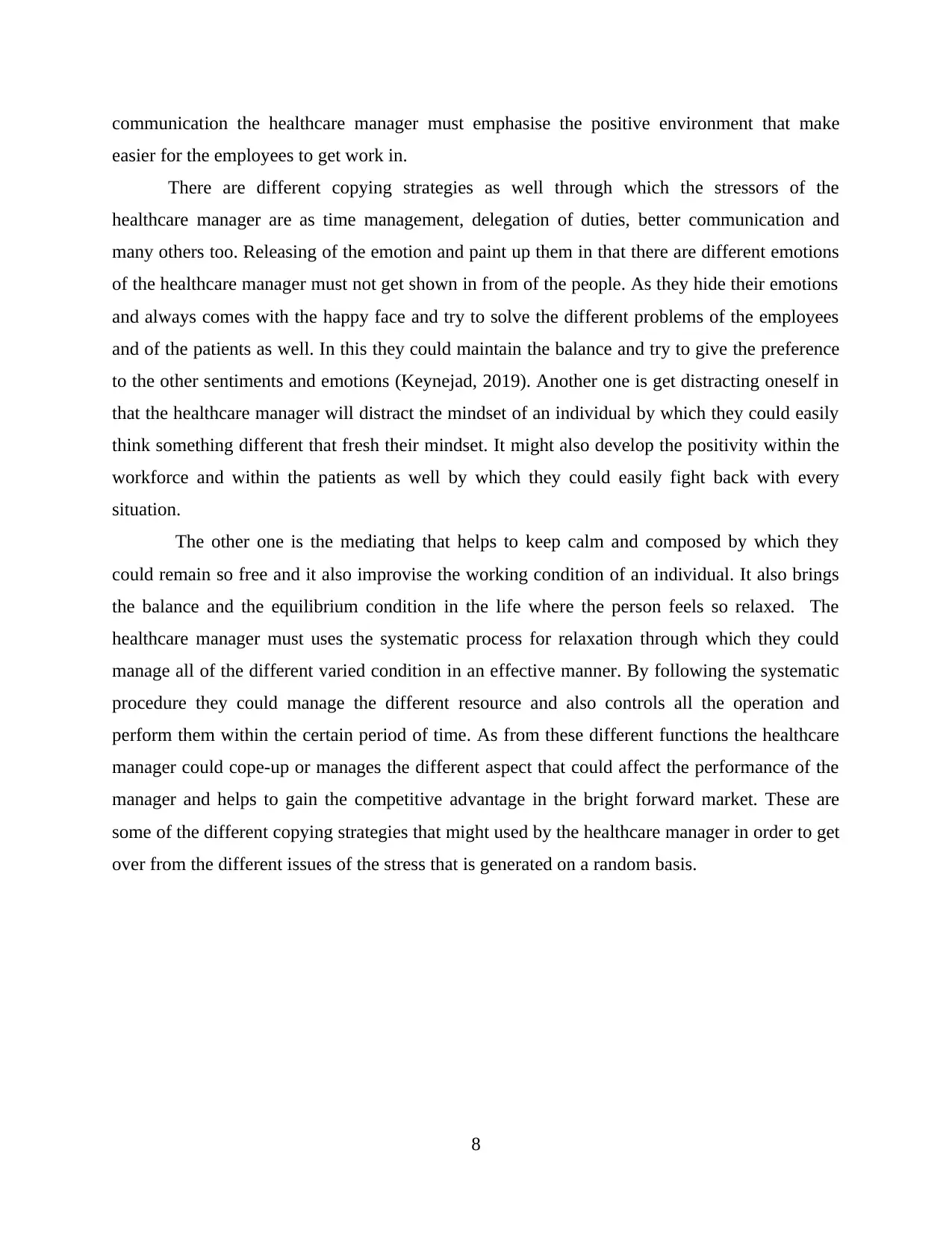
communication the healthcare manager must emphasise the positive environment that make
easier for the employees to get work in.
There are different copying strategies as well through which the stressors of the
healthcare manager are as time management, delegation of duties, better communication and
many others too. Releasing of the emotion and paint up them in that there are different emotions
of the healthcare manager must not get shown in from of the people. As they hide their emotions
and always comes with the happy face and try to solve the different problems of the employees
and of the patients as well. In this they could maintain the balance and try to give the preference
to the other sentiments and emotions (Keynejad, 2019). Another one is get distracting oneself in
that the healthcare manager will distract the mindset of an individual by which they could easily
think something different that fresh their mindset. It might also develop the positivity within the
workforce and within the patients as well by which they could easily fight back with every
situation.
The other one is the mediating that helps to keep calm and composed by which they
could remain so free and it also improvise the working condition of an individual. It also brings
the balance and the equilibrium condition in the life where the person feels so relaxed. The
healthcare manager must uses the systematic process for relaxation through which they could
manage all of the different varied condition in an effective manner. By following the systematic
procedure they could manage the different resource and also controls all the operation and
perform them within the certain period of time. As from these different functions the healthcare
manager could cope-up or manages the different aspect that could affect the performance of the
manager and helps to gain the competitive advantage in the bright forward market. These are
some of the different copying strategies that might used by the healthcare manager in order to get
over from the different issues of the stress that is generated on a random basis.
8
easier for the employees to get work in.
There are different copying strategies as well through which the stressors of the
healthcare manager are as time management, delegation of duties, better communication and
many others too. Releasing of the emotion and paint up them in that there are different emotions
of the healthcare manager must not get shown in from of the people. As they hide their emotions
and always comes with the happy face and try to solve the different problems of the employees
and of the patients as well. In this they could maintain the balance and try to give the preference
to the other sentiments and emotions (Keynejad, 2019). Another one is get distracting oneself in
that the healthcare manager will distract the mindset of an individual by which they could easily
think something different that fresh their mindset. It might also develop the positivity within the
workforce and within the patients as well by which they could easily fight back with every
situation.
The other one is the mediating that helps to keep calm and composed by which they
could remain so free and it also improvise the working condition of an individual. It also brings
the balance and the equilibrium condition in the life where the person feels so relaxed. The
healthcare manager must uses the systematic process for relaxation through which they could
manage all of the different varied condition in an effective manner. By following the systematic
procedure they could manage the different resource and also controls all the operation and
perform them within the certain period of time. As from these different functions the healthcare
manager could cope-up or manages the different aspect that could affect the performance of the
manager and helps to gain the competitive advantage in the bright forward market. These are
some of the different copying strategies that might used by the healthcare manager in order to get
over from the different issues of the stress that is generated on a random basis.
8
Paraphrase This Document
Need a fresh take? Get an instant paraphrase of this document with our AI Paraphraser
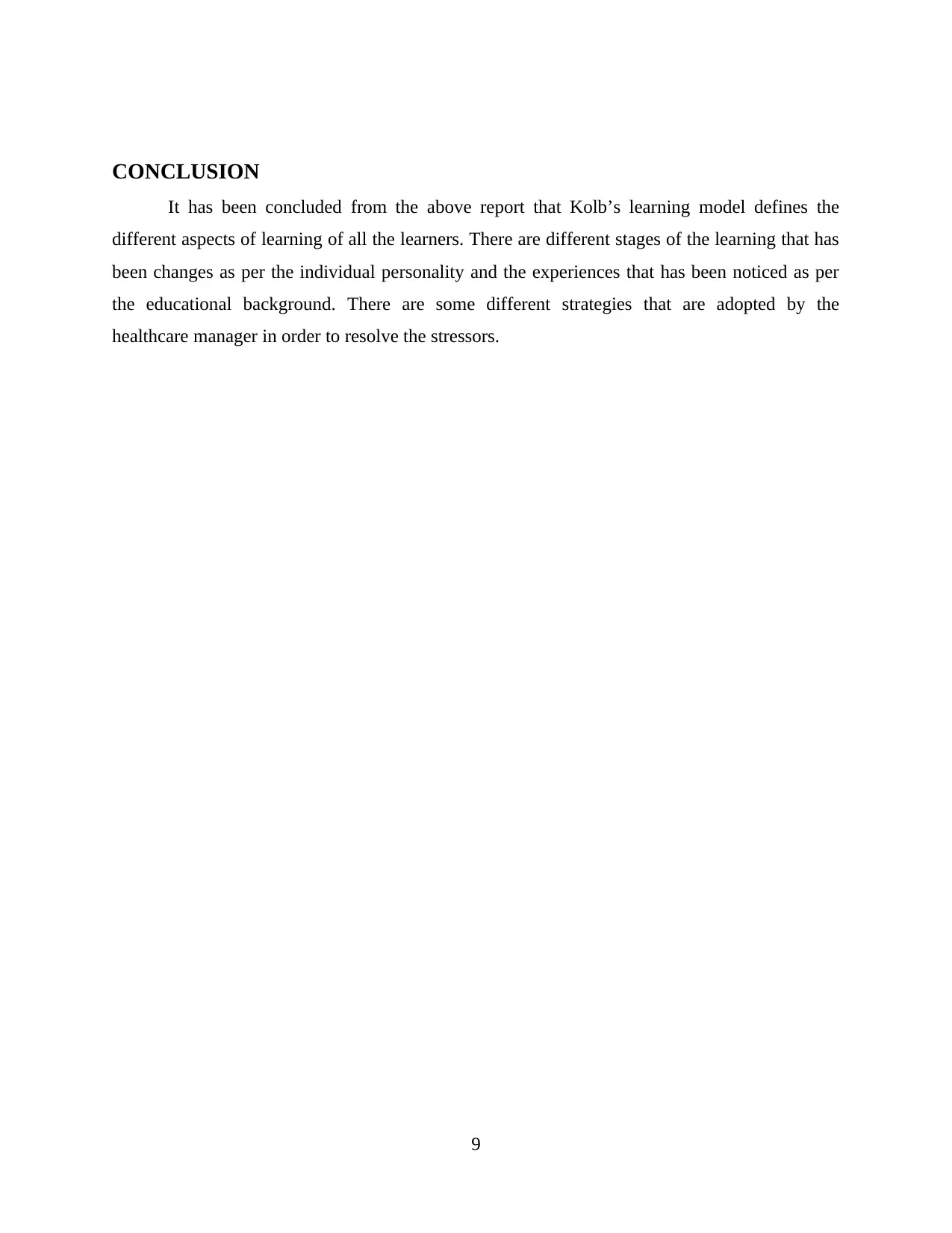
CONCLUSION
It has been concluded from the above report that Kolb’s learning model defines the
different aspects of learning of all the learners. There are different stages of the learning that has
been changes as per the individual personality and the experiences that has been noticed as per
the educational background. There are some different strategies that are adopted by the
healthcare manager in order to resolve the stressors.
9
It has been concluded from the above report that Kolb’s learning model defines the
different aspects of learning of all the learners. There are different stages of the learning that has
been changes as per the individual personality and the experiences that has been noticed as per
the educational background. There are some different strategies that are adopted by the
healthcare manager in order to resolve the stressors.
9
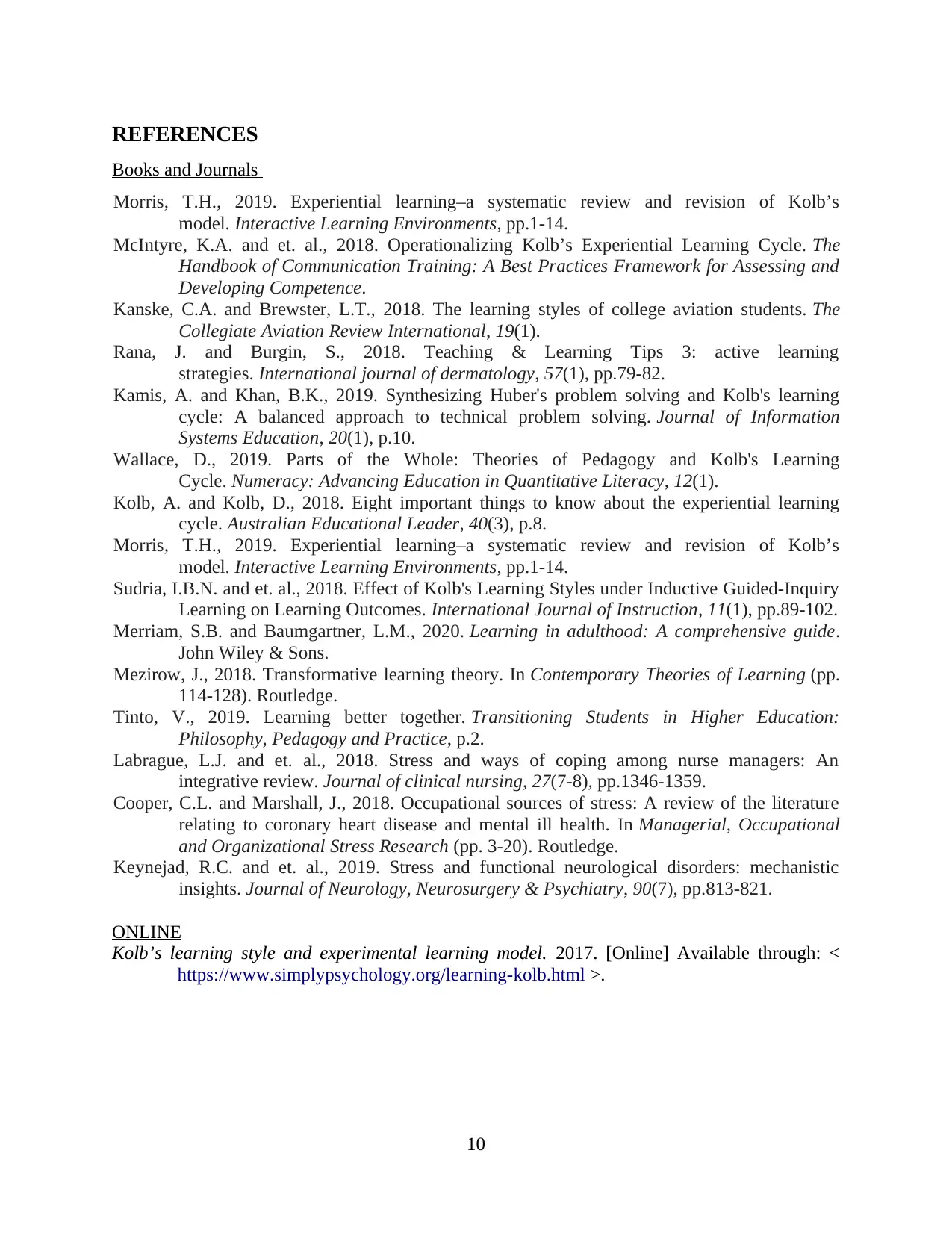
REFERENCES
Books and Journals
Morris, T.H., 2019. Experiential learning–a systematic review and revision of Kolb’s
model. Interactive Learning Environments, pp.1-14.
McIntyre, K.A. and et. al., 2018. Operationalizing Kolb’s Experiential Learning Cycle. The
Handbook of Communication Training: A Best Practices Framework for Assessing and
Developing Competence.
Kanske, C.A. and Brewster, L.T., 2018. The learning styles of college aviation students. The
Collegiate Aviation Review International, 19(1).
Rana, J. and Burgin, S., 2018. Teaching & Learning Tips 3: active learning
strategies. International journal of dermatology, 57(1), pp.79-82.
Kamis, A. and Khan, B.K., 2019. Synthesizing Huber's problem solving and Kolb's learning
cycle: A balanced approach to technical problem solving. Journal of Information
Systems Education, 20(1), p.10.
Wallace, D., 2019. Parts of the Whole: Theories of Pedagogy and Kolb's Learning
Cycle. Numeracy: Advancing Education in Quantitative Literacy, 12(1).
Kolb, A. and Kolb, D., 2018. Eight important things to know about the experiential learning
cycle. Australian Educational Leader, 40(3), p.8.
Morris, T.H., 2019. Experiential learning–a systematic review and revision of Kolb’s
model. Interactive Learning Environments, pp.1-14.
Sudria, I.B.N. and et. al., 2018. Effect of Kolb's Learning Styles under Inductive Guided-Inquiry
Learning on Learning Outcomes. International Journal of Instruction, 11(1), pp.89-102.
Merriam, S.B. and Baumgartner, L.M., 2020. Learning in adulthood: A comprehensive guide.
John Wiley & Sons.
Mezirow, J., 2018. Transformative learning theory. In Contemporary Theories of Learning (pp.
114-128). Routledge.
Tinto, V., 2019. Learning better together. Transitioning Students in Higher Education:
Philosophy, Pedagogy and Practice, p.2.
Labrague, L.J. and et. al., 2018. Stress and ways of coping among nurse managers: An
integrative review. Journal of clinical nursing, 27(7-8), pp.1346-1359.
Cooper, C.L. and Marshall, J., 2018. Occupational sources of stress: A review of the literature
relating to coronary heart disease and mental ill health. In Managerial, Occupational
and Organizational Stress Research (pp. 3-20). Routledge.
Keynejad, R.C. and et. al., 2019. Stress and functional neurological disorders: mechanistic
insights. Journal of Neurology, Neurosurgery & Psychiatry, 90(7), pp.813-821.
ONLINE
Kolb’s learning style and experimental learning model. 2017. [Online] Available through: <
https://www.simplypsychology.org/learning-kolb.html >.
10
Books and Journals
Morris, T.H., 2019. Experiential learning–a systematic review and revision of Kolb’s
model. Interactive Learning Environments, pp.1-14.
McIntyre, K.A. and et. al., 2018. Operationalizing Kolb’s Experiential Learning Cycle. The
Handbook of Communication Training: A Best Practices Framework for Assessing and
Developing Competence.
Kanske, C.A. and Brewster, L.T., 2018. The learning styles of college aviation students. The
Collegiate Aviation Review International, 19(1).
Rana, J. and Burgin, S., 2018. Teaching & Learning Tips 3: active learning
strategies. International journal of dermatology, 57(1), pp.79-82.
Kamis, A. and Khan, B.K., 2019. Synthesizing Huber's problem solving and Kolb's learning
cycle: A balanced approach to technical problem solving. Journal of Information
Systems Education, 20(1), p.10.
Wallace, D., 2019. Parts of the Whole: Theories of Pedagogy and Kolb's Learning
Cycle. Numeracy: Advancing Education in Quantitative Literacy, 12(1).
Kolb, A. and Kolb, D., 2018. Eight important things to know about the experiential learning
cycle. Australian Educational Leader, 40(3), p.8.
Morris, T.H., 2019. Experiential learning–a systematic review and revision of Kolb’s
model. Interactive Learning Environments, pp.1-14.
Sudria, I.B.N. and et. al., 2018. Effect of Kolb's Learning Styles under Inductive Guided-Inquiry
Learning on Learning Outcomes. International Journal of Instruction, 11(1), pp.89-102.
Merriam, S.B. and Baumgartner, L.M., 2020. Learning in adulthood: A comprehensive guide.
John Wiley & Sons.
Mezirow, J., 2018. Transformative learning theory. In Contemporary Theories of Learning (pp.
114-128). Routledge.
Tinto, V., 2019. Learning better together. Transitioning Students in Higher Education:
Philosophy, Pedagogy and Practice, p.2.
Labrague, L.J. and et. al., 2018. Stress and ways of coping among nurse managers: An
integrative review. Journal of clinical nursing, 27(7-8), pp.1346-1359.
Cooper, C.L. and Marshall, J., 2018. Occupational sources of stress: A review of the literature
relating to coronary heart disease and mental ill health. In Managerial, Occupational
and Organizational Stress Research (pp. 3-20). Routledge.
Keynejad, R.C. and et. al., 2019. Stress and functional neurological disorders: mechanistic
insights. Journal of Neurology, Neurosurgery & Psychiatry, 90(7), pp.813-821.
ONLINE
Kolb’s learning style and experimental learning model. 2017. [Online] Available through: <
https://www.simplypsychology.org/learning-kolb.html >.
10
⊘ This is a preview!⊘
Do you want full access?
Subscribe today to unlock all pages.

Trusted by 1+ million students worldwide
1 out of 12
Related Documents
Your All-in-One AI-Powered Toolkit for Academic Success.
+13062052269
info@desklib.com
Available 24*7 on WhatsApp / Email
![[object Object]](/_next/static/media/star-bottom.7253800d.svg)
Unlock your academic potential
Copyright © 2020–2025 A2Z Services. All Rights Reserved. Developed and managed by ZUCOL.




